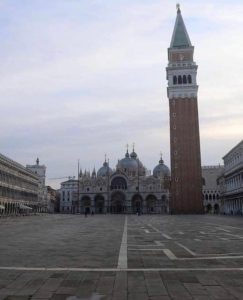Life, as we know, is taking a heavy toll on us and the coronavirus is responsible, the culture of the world as we once knew it is being reshaped to something most people find difficult to handle in just a few months. Every aspect of human life has been touched from the population, world economy, education, entertainment, sports, religion, social and family life.
Even though the severe changes are gradually been felt in Nigeria, let me work you through sectors that have obviously changed across the world in just a few weeks, to help you put things in perspective, and possibly prepare for the changes that may occur very soon in Nigeria as well.
EDUCATION
First, the Coronavirus has changed the worlds educational system in just a few weeks. Asia, Europe, the Middle East, and the United States, have taken drastic measures to curtail the spread of the global pandemic. Schools and universities have been shut down in several countries, over 160 countries have implemented nationwide closures, impacting over 87% of the world’s student population… Some families have resulted in home-schooling their children especially in high impact areas like China, Italy, South Korea, and Iran.
As inconvenient as this may have turned out for most people, it has stirred a new wave of innovative learning styles. Centuries-old style of teaching and learning are changing, more schools are beginning to embrace interactive apps as a means of learning. China even used live television broadcasts to get learning materials across to 120million citizens. In Lebanon, students leveraged online learning for subjects, including physical education. They shot videos of themselves during their athletic training and sports at home and sent them to their teachers as homework.
This new trajectory education has taken has a bright side to it, it pushes students to learn new digital skills in a world where technology has taken over our lives. With this, students can learn anywhere and at any time, and these new learning modalities could work side by side existing systems when the coronavirus eventually passes.
SOCIAL LIFE AND ENTERTAINMENT
Social life has been one of the most affected across the world since the coronavirus struck. An estimated 1.7 billion people are under lockdown across the world.
Many People are being advised to avoid large gatherings, practice social distancing and self-isolate to help curtail the spread of the virus. Due to panic buying, countries have seen the longest grocery lines they have ever had, essentials are fast running out in these stores, with people fighting over the little supplies that are left.
Even regular greeting is different since handshakes have been discouraged, many now bump elbows or just greet each other from a safe distance. In Nigeria, the ever-busy Lagos state was put under partial lockdown by the Lagos state government on the 26th of March 2020, making it the first state in Nigeria to declare a 70% lockdown.

In Italy, you cannot step out of your home without an auto certification that grants you passage through the many security checkpoints. Renowned recreational centres like Disney land have been shut down, the NBA season was postponed indefinitely, The St. Patrick’s Day parade in new your city was cancelled for the first time in 258 years. Broadway theatre has also been shut down, music artists like the Jonas Brothers have cancelled performances and tours.


Comedy skits, jokes, and artworks are now centred on the coronavirus. Artists are looking for creative ways to spread the word on preventive methods with hopes that it would be the difference that flattens the spread curve.
RELIGION
Religion has not been the same since the coronavirus hit the world, there have been both voluntary and enforced cancellations of worship services of different faiths.
There have also been cancellations of pilgrims surrounding observations and festivals. Across the world and most recently in Nigeria, worship centres have offered worship through Livestream alone. Religious organizations have widely dispensed relief materials to those affected and to medical personnel.

Many religions now focus prayers to end the covid-19 pandemic, President Donald Trump even designated March 15th, 2020 as a national day of prayer for Americans to seek help from God in the face of the pandemic.
Christianity and Christians
The Vatican cancelled the Holy Week observances in Rome, which occur during the last week of the Christian penitential season of Lent. Many dioceses have recommended older Christians to stay at home rather than attending church services on Sundays, which is usually required; some churches have made church services available via radio, online live streaming or television broadcast.

For the first time recorded in history the catholic pope on 20th March 2020 during his live-streamed morning Mass said People who cannot get to confession because of the coronavirus lockdown or another serious reason can go to God directly, be specific about their sins, request pardon and experience God’s loving forgiveness.
Additionally, those who cannot receive the sacrament of the anointing of the sick, especially those afflicted with the coronavirus, may receive a plenary indulgence by reciting prayers on their own, with the presence of a crucifix being recommended. Other Christian churches, including non-denominational churches, have begun utilizing Livestream with a chat feature and emphasizing gathering in small groups, such as immediate families while suspending in-person church attendance.
Videos have surfaced showing both the Zimbabwean and Indian police officers beating up defaulters who went against the government to stay home to order. Also over the weekend in southwest Nigeria, security agencies stormed some churches to stop worshippers from conducting Sunday service. I guess it is online services from now on.
Islam and Muslims
Saudi Arabia closed the Great Mosque of Mecca for Umrah visitors, which is one of the five pillars of Islam, and also banned touching Kaaba. Mosques have also closed in Singapore and Malaysia. Religious leaders in both Kuwait and Saudi Arabia have strongly urged people to pray in their homes and avoid going to Mosques for regular and Friday prayers.
There is currently concern that the virus may be hard to control during the travel and gatherings around Ramadan and Eid al-Fitr. In Nigeria, some mosques still observe their daily prayers with larger mosques observing their Friday Jumat prayers. President Muhammad Buhari as of Friday 20th March still attended a Jumat prayer.
Right now the world is facing a complete overhaul in culture, one that may cause nations to put in place lasting reforms that will create new structures to our lives moving forward. In this time our government needs to model the measures taken in developed countries to ensure our way of life is reformed for the better. We need to be proactive in developing new ways of learning for out of school students. There needs to be a working system that allows social industries that will suffer in
Nigeria due to the covid-19 pandemic stays afloat. There are lives and livelihoods connected to these religious institutions, a complete shutdown of our country would cause these people to wallow in severe poverty. Many will go hungry and the effects on other aspects like culture will cause the nation as a whole to sink if measures are not taken, now and fast.
The effect of the oil price war between Saudi Arabia and Russia as well as the global health pandemic caused by the Covid-19 virus is expected to throw Nigeria into another recession by the end of 2020.
In confirmation, yesterday the Minister of Finance, Budget and National Planning, Mrs Zainab Ahmed, has warned that Nigeria may go into recession if the coronavirus (COVID-19) pandemic continues for the next couple of months. She stated this during her appearance on Channels Television’s Politics Today where she gave an update on measures taken to mitigate the effect of coronavirus on the nation’s economy. She said…
“We are hopeful that this pandemic will be limited in time,” the minister said during the interview on Friday.
She added, “If it is an average of three months, we should be able to close the year with positive growth. But if it goes longer than that – six months, one year – we will go into recession.”
